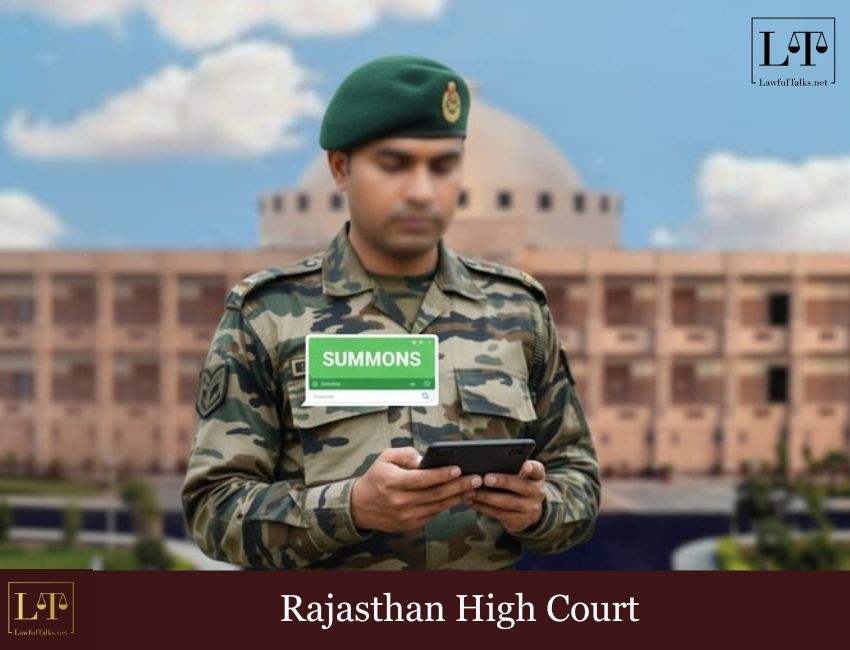Allahabad HC Sets Aside Afzal Ansari's Conviction, Allows Him to Continue as MP

In a notable decision, Justice Anoop Kumar Dhand of the Rajasthan High Court ruled that serving summons to a soldier through WhatsApp does not constitute valid legal service. The Court stressed that in such matters, compliance with the special procedure prescribed under Order 31 Rule 5 of the General Rules (Civil & Criminal), 2018, and Order V Rule 28 of the Code of Civil Procedure (CPC) is mandatory, as these provisions specifically regulate the service of summons on Armed Forces personnel.

Background:
The matter arose from an ex-parte order passed by the Family Court at Karauli in a maintenance proceeding filed by the wife of the petitioner under Section 125 of the Criminal Procedure Code. The petitioner, serving as a sepoy in the Indian Army, was at the relevant time posted in a treacherous high-altitude operational area.
The Family Court had issued summons to the petitioner on three separate occasions, but each attempt returned unserved. Subsequently, the Court resorted to sending the summons via WhatsApp, treating the message as sufficient service. Based on this, the Family Court proceeded ex-parte and directed the petitioner to pay a monthly maintenance of ₹12,000 to his wife.
The petitioner challenged this order before the High Court, arguing that the Family Court had completely disregarded the mandatory procedure prescribed for serving summons on personnel of the Armed Forces.
It was contended that the process of service should have been through the petitioner’s Commanding Officer, allowing sufficient time for arrangements to relieve him from duty so that he could appear before the court.
On the other hand, counsel for the respondent argued that the petitioner was duly informed of the proceedings through the WhatsApp communication and, despite having knowledge of the case, deliberately failed to appear. It was therefore contended that the Family Court had not erred in proceeding ex-parte.
Court’s Observation:
After examining the record and relevant provisions, the High Court reiterated that the law has created a distinct and mandatory mechanism for serving summons upon members of the Armed Forces. The Court quoted:
“The Army, the Air Force and the Navy is collectively known as the Armed Forces which are highly organized and disciplined forces and are specially designed for carrying out battles, protecting the State from the threat of external forces and to conduct other special operations… Special procedures/processes have been made by the Legislature for service of summons upon the members of the Armed Forces… when a case is filed against them in their personal capacity.”
Justice Dhand emphasized that Order 31 Rule 5 of the General Rules (Civil & Criminal), 2018 requires that the process for a soldier, sailor, or airman must be sent for service to his Commanding Officer, along with a copy retained by the concerned individual.
Likewise, Order V Rule 28 CPC mandates that the court shall send the summons for service to the defendant’s Commanding Officer. This process ensures adequate time for making necessary arrangements to relieve the personnel from their operational duties.
The Court noted the certificate issued by the petitioner’s Commanding Officer, which confirmed that he was posted in an operational area and could not have been relieved during the relevant period. The Family Court, despite this, failed to follow the statutory procedure and treated the WhatsApp message as sufficient service.
In categorical terms, the High Court declared:
“Hence, under such circumstances, the service of summons upon the petitioner on his WhatsApp mobile number cannot be treated as sufficient in view of the mandate contained under Order 31 Rule 5 of the General Rules (Civil & Criminal), 2018 and under Order V Rule 28 CPC.”
Court Directions:
Holding that the Family Court’s approach amounted to a gross violation of the principles of natural justice, the High Court set aside the ex-parte order and remitted the matter to the Family Court for fresh adjudication after affording due opportunity of hearing to both parties.
Furthermore, Justice Dhand directed that a copy of the judgment be circulated among all Judicial Officers and Family Court Judges across the State to ensure adherence to the prescribed legal process in similar matters.
Case Title: Deevan Singh v/s. State of Rajasthan & Anr. S.B. Criminal Revision Petition No. 104/2025
Leave a Comment

Het Dedhia
3rd Year Law Student from SVKM's Pravin Gandhi College of Law
Latest Posts
Categories
- International News 19 Posts
- Supreme Court 318 Posts
- High Courts 330 Posts






















































































































































































































































































































































































































































































































































































































































































